News
Need of the hour: Special status for teachers
PARVATHY JAYAKRISHNAN examines the many valid reasons why teachers need to be given the respect, remuneration, safety and security they deserve
Published
5 years agoon
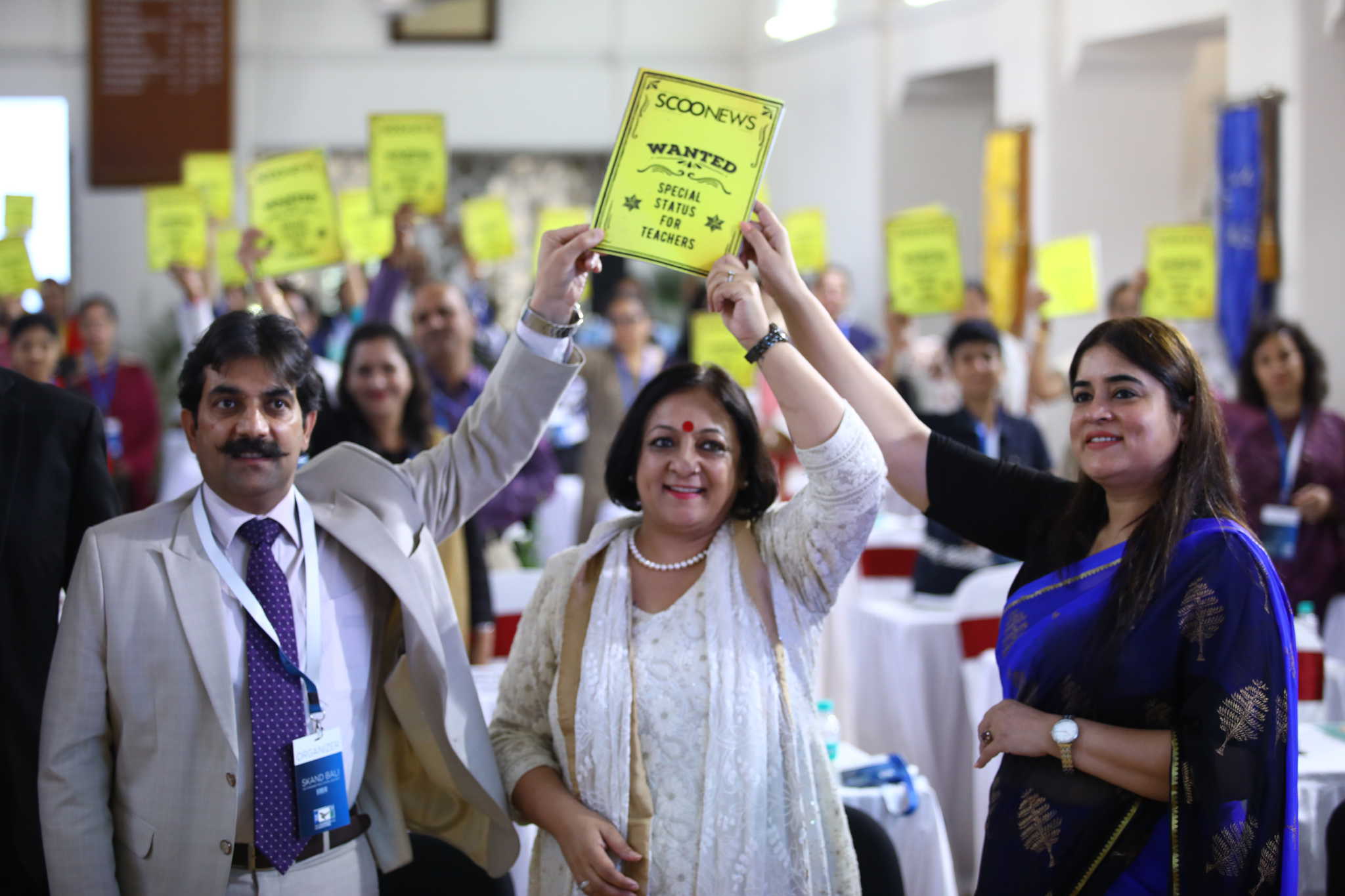
A teacher fills in as a parent in the formative years of a child, she/he guides and corrects a child when he make mistakes, encourages students to reach for the stars and applauds their achievements. All packed in one, a teacher’s role is not an easy one. A teacher sometimes takes on the role of a parent, a friend, a confidant and much more. A student spends so many years interacting with his/her teachers on a daily basis and the role of a teacher in a student’s life cannot be replaced by any other professional in society. And clearly, it is the teachers who are responsible for building good citizens. Hence, good teachers are truly what a country needs to move forward. The unfortunate reality is, despite all these responsibilities and roles resting on a country’s teachers, they not given the respect and special status they truly deserve.
An army man in uniform or a doctor is well-respected in our society. In some states, patients remove their footwear before entering a doctor’s chamber as a mark of respect – the kind of respect that you give God while entering a place of worship. We smile and sometimes even bow our heads as a mark of respect when we see an army man in uniform. However, the work and efforts of teachers are more often than not ignored in our society. Is it a kind of conditioning that we are brought up with?
We are very proud of our sacred guru-shishya parampara, which is a tradition of spiritual relationship and mentoring where learning is transmitted from a guru "teacher" to a shishya "disciple". Such knowledge, whether it be Vedic, agamic, architectural, musical or spiritual, is imparted through the developing relationship between the guru and the disciple. We talk ever so proudly about our Gurukul system of learning where the students live near the guru or in the same house as the guru and learn lessons of life from the guru. The guru does this without accepting any fees from the students because the relationship between a teacher and student is considered sacred.
Sonal Ahuja, Learning evangelist, founder, House of Learning explains that for thousands of years, the Indian subcontinent revered its teachers to the highest level. “Indian tradition dictated that teachers must be treated with respect that paralleled kings. The Mahabharata famously depicted the story of Eklavya, a gifted archer who cut off this thumb as Guru Dakshina to show his unconditional gratitude to his Guru, Drona.”
So, we cannot completely blame our conditioning because our traditions and values teach us to respect “the teacher” the same way that you respect God. Then where did we go wrong and why aren’t teachers today given the kind of respect they deserve?
Urvashi Warman, Principal, The Palace School, The City Palace, Jaipur believes that the government needs to step in and set high parameters for teacher selection. She says, “When we have such stringent standards set at the entry level for doctors and engineers, why are we so lax in raising the bar at the entry level to become a teacher … a teacher who actually helps to give good doctors and engineers to the society? The government should also set decent rates for monthly emoluments so the teacher is not forced to indulge in additional commercial activities to make two ends meet. This by far is diluting not only the standard of education being imparted but is also lowering the stature of a teacher as he gets relegated to the level of a commercial tutor rather than getting elevated to the pedestal of an Acharya or Guru.”
Shalini Dahiya, educator, Modern School – Barakhamba Road, New Delhi explains why teaching is underrated today.
“Occupational status depends on the public valuing of the competence, role and overall contribution of a particular occupation to individual and social welfare.
Teachers are struggling for a special status as firstly they are not considered as a temple of knowledge or a good character building instrument, with the surge of social media and too much of information available on the internet.”
Teachers in other countries
Japan
Japan is one of the countries in the world where the teaching profession is respected and valued. Here’s how they make sure that teachers are given the special status they deserve…
Teachers in Japan have traditionally been paid better than other civil servants. Japan’s average teacher salary for a lower secondary school teacher after 15 years of service is US$47,561, as compared to the OECD (Organisation for Economic Co-operation and Development) average of US$40,569. Following WWII, over concerns about teacher shortages, the Prime Minister decreed that teachers would be paid 30 percent more than other civil servants. Although this gap has decreased over the last 50 years, by law teachers remain relatively highly paid among civil servants. Also, teacher salaries do not vary much across the country because teachers are paid from both the national government and the prefecture government so they are relatively consistent regardless of an area’s income levels or property values.
In Japan, teachers are addressed with the honorific sensei, a term also used when addressing a doctor or member of Parliament. Teachers are held in such high regard that they are often contacted before parents by the police if a student is in trouble with the law.
The teaching profession in Japan is also highly selective which ensures that only the best and most committed teachers enter the profession. Those who do make the cut only do so after a rigorous set of school board exams and evaluations and teachers must hold a degree from an institution of higher education.
Finland
The Finland education system regularly tops the international Pisa performance rankings and the teachers need to take the credit for it. Finland’s teachers are different from the rest of the world because they believe that extensive training is the basis for giving teachers the autonomy to work the way they want. The result is a highly prized profession and good education system. This has even led to educational tourists coming in to learn the Finnish experience. The high-level training is the basis for giving young teachers a great deal of autonomy to choose what methods they use in the classroom – in contrast to most countries where teaching feels like a profession that oscillates between administration and giving tests to students. In Finland, teachers are largely free from external requirements such as inspection, standardised testing and government control – school inspections were scrapped in the 1990s. In Finland, teachers are given high-quality education so that they know how to use the freedom they are given in the classroom and they learn to solve problems in a research-based way.
China
The 2013 Varkey Foundation Global teacher status index report revealed that it is only in China that people think of teachers are being most closely compared to doctors. In the US, Brazil, France and Turkey, people thought teachers were most similar to librarians and in New Zealand people think the job of teaching is most similar to nursing. The report found that teachers in China have the highest level of public respect. Most foreign English teachers in China receive benefits like free or reimbursed airfare to and from their home country, and/or free furnished housing. Many teachers also receive health insurance and paid vacation. It is one of the few countries where parents were most likely to encourage their kids to become teachers.
Respect and remuneration
One important dimension of how an occupation is regarded, and which is inextricably linked to standing or social status, is pay. An individual’s standing in a culture depends on how much they are paid in absolute or relative terms.
The 7th Pay Commission, launched in September 2015 ensured that the teachers in primary schools, secondary and higher secondary schools, colleges and universities get a hiked net salary of 16 per cent. However, the yearly increment of 3 percent did not change.
Dr. Dheeraj Mehrotra, National Teacher Awardee 2005 & Academic Evangelist, Next Education India believes that “The imbalance from the teaching profession, highlights a great divide with narration of unethical practices of low salary and refund of said amount via account transfer as reverse payment. There must be a check on equal pay for all grades and at all levels.”
It is important that teachers are provided with a substantial yearly increment to prevent attrition and keep them motivated. Also, there is a huge gap between the salaries of a primary school teacher and a high school teacher. This gap needs to be addressed as primary school teachers are equally important and this has to be shown by ensuring their salaries are on par with the rest.
Urvashi Warman, Principal, The Palace School, The City Palace, Jaipur avers, “The teacher is by far a silent sentinel of a country's future and if this sentinel is not compensated adequately in terms of financial and social security, the country's future is sure to be doomed. This doom is inevitable because the poorly compensated teacher, who is a role model for his students,is sure to indulge in acts which totally demean his stature and thus sets a poor example for his students to emulate.”
According to Dr Jagpreet Singh, Headmaster, The Punjab Public School, Nabha, “The primary reason we all work is for money – so teachers should get their due financial recognition which will definitely bring young, intellectual people into this noble profession. Proper management of funds by the school authorities should be done and teachers should be given regular incentives and bonuses on the basis of their performance. ”
Measures to ensure teachers’ financial stability
Teaching is a profession which requires going beyond the call of duty to deliver great results. Financial stability is a must for teachers and the government must bring in special allowances and privileges for teachers so that they can sustain themselves well without having to find secondary jobs to make ends meet. The remuneration you receive is also a sign of your value to the school and an underpaid teacher will always feel unimportant.
Teachers can be granted allowances based on the number of years of service or excellence in their work. It is worth a thought whether the salaries of teachers need to be taxed at all or even if they are taxed, there needs to be a separate slab which will ensure minimal taxation.
Every school can also ensure that a teacher’s child learns for free or is given a subsidized fee.
Lavita Kacker, Head of Department- Social Sciences, Sacred Heart School, Kalyan suggests that “Financial stability measures for teachers may include provision of housing allowances, reduction in taxation on income, attractive investment schemes, medical reimbursement, concession on public transport and better pension facilities.”
Shraddha Bhatnagar, Headmistress (Head of Cambridge Section), Seedling World School, Udaipur wishes that the government checks the imbalance between salaries of teachers in private and government-run schools.
Proper remuneration is important to boost a teacher’s self-confidence and make her/him feel secure in the job. Yearly increments and bonuses are also required for the same reason. A job which does not do that will, at some point, end up being taxing.
“The pay commissions are restricted to government aided, affiliated and government run schools. There is no start up point for early childhood sector and private schools where teachers are exploited with low pay scales. A respectful minimum pay scale should be mandatory for schools to pay to their teachers. There should be levels of training with specialisations in teaching as in the medical field and accordingly a pay scale armed with good gratuity, pension, and life covers for financial stability,” says Smriti Agarwal, Sr. Headmistress, Podar Jumbo Kids Powai, Mumbai.
Kavitha Vyas, Director, Crystal Kids Pre-School, Vadodara mentions that job security is absolutely necessary to ensure a teacher’s financial stability. They can be trained further for higher grades and regular promotions to improve their pay scale. More social security and medical benefits for their family are also required, she maintains.
Safety for teachers in schools
It is not uncommon today to hear the news of a teacher being stabbed by a student or attacked by an adult or a mob in the school premises. So tricky is the state of affairs today that teachers are often scared of even punishing a child for doing wrong for fear of his/her own safety. Safety of students in schools is always talked about as a priority that is pursued by parents. However, a school should also provide safety and support to its teachers so that they can function normally and without fear. Merely providing compensation to the family of the deceased is not a solution to the problem. Teachers need to feel safe to do their job faithfully and without fear. School authorities need to ensure this happens. Parents also need to teach their children the importance of teachers in their lives.
According to Dr Jagpreet Singh, Headmaster, The Punjab Public School, Nabha, “A school should be as safe for a teacher as it is for a student. Rather than enforcing restrictive discipline among children, the parents should take equal responsibility of bringing up their children and instil strong moral values and ethics.”
Speaking about the need for an emergency response system,Yasin Khatri, Sacred Heart School, Kalyan explains that teachers must be trained to handle any crisis that takes place around them. The feasibility of the emergency response system must be checked through frequent mock drills at school. “Students must be sensitised and teachers should be trained to identify such cases within the classroom or around. Immediate psychological help must be provided to pupils who need it.”
Priyanka Singh, ICT Educator, The HDFC School, Gurgaon emphasises that schools should have a security check system at the entrance so that people cannot enter a school premise with weapons. She also suggests schools have a police booth in its vicinity so that help can be immediately sought in case of any mishaps.
“The Government must have good health care and on-call medical facilities in every school across the country. Metal detectors and CCTV cameras should be installed within the school. EQ and IQ evaluation of students should be conducted to identify problems amongst students. Uniform level of safety and security measures for all schools should be ensured,” says Lavita Kacker, Head of Department – Social Sciences, Sacred Heart School, Kalyan.
Suggesting that self-defence for teachers can be part of the teacher training programme, Smriti Agarwal, Sr. Headmistress, Podar Jumbo Kids Powai, Mumbai also advocates instant justice and firm law in cases where teachers are physically, emotionally or sexually harassed, so that it creates a sense of fear in any individual towards the consequences of such an act.
Urvashi Warman, Principal, The Palace School, The City Palace, Jaipur has a different opinion on how to tackle the safety issue of teachers in schools. She says, “The solution to violence in schools does not lie in turning the school or any educational institute into a fortress. The solution lies in empowering the teaching faculty with proper life skills which they need to impart to students from a very young age. When the student community is sensitised and learns how to deal with issues like rejection, failures, grief, disappointment and general strengthening of the emotional quotient, the problem of increase in violence is sure to dissipate very soon.”
What we can do to ensure teachers are respected
The role of teachers is paramount in shaping the future of the country. The government should include teachers while reforming educational policies. With the digitisation of education happening at a rapid pace, the role of teachers is also changing drastically. Today, teachers are taking on roles of being advisors, friends and disciplinarians to students rather than the conventional role of a teacher who only explains what is there in the textbook. However, the role of a teacher is indispensable in a student’s life and it is imperative that the student understands it and respects the teacher accordingly.
Suman Sood, Territory Head, Kolkata Chapter, Early Childhood Association explains the importance of giving grants to teachers so that they can better themselves. She says “Involved and passionate teachers are always wanting to do things differently so that they may enhance learning of their students. Innovative teaching is important, but it can be expensive. The US model of giving grants to teachers for enhancing their skills and using funds for buying teaching aids can be followed for our teachers. Some of the grants given may be Professional Development Grants for Teachers, Funds for Classroom Enrichment/Student Achievement, STEM Grants, and Humanities Grants.”
Shraddha Bhatnagar, Headmistress (Head of Cambridge Section), Seedling World School, Udaipur suggests, “Government can think of rewarding/awarding teachers annually for their outstanding contributions. One of these rewards can be the official use of the upaadhi ‘Guruji’ or ‘Gurudev’ with their names.”
Summary
Verbally, we talk highly of teachers, praise their work and value them. But mere lip service is not enough. We need to show it by giving them the special status they truly deserve; by showing them that they are indeed doing a selfless job in raising citizens of this nation. We can take a leaf out of the books of some of the nations who treat their teachers on par with other noble professions and provide them with special rights. We need to make our teachers feel safe, secure and wanted.
To make sure that teachers continue in the same profession, we need to ensure that they are guaranteed financial stability and substantial yearly increments. A change in the mindset of parents is also very much required. It is very common to see parents wanting to see their children become doctors or engineers; we need to encourage our children to become teachers as well as ensure that the teaching profession is on par with any other profession. To facilitate this better, the salaries in the teaching profession need to be on par with those of other professions. Let us bring back the glory of the teaching profession from the days of Dronacharya or Ved Vyas and ensure that teachers today are treated with love and respect. We need to make a strong effort for this but together, we can.
What teachers want…
“Financial security being the top priority, recognition for their selfless service in the upbringing of others’ children which goes unnoticed. Teachers posted in remote areas should get extra allowances. Quality time to spend with family will work as an incentive in improving their output. Also, monitoring through CCTVs should be focused on students’ actions rather than teachers.”
Dr Jagpreet Singh, Headmaster, The Punjab Public School, Nabha
“Matching teachers’ salary to the best salary in the market is a must. Sponsorship of teachers to visit schools across the world to learn the best practices is important. Collaboration among Indian teachers and creating a forum of teachers to share best practices is also necessary. Teacher education courses should be enhanced and the process for it should be eased.”
Mohammed Azhar, Principal, Knowledge Academy School, Chennai
“Teacher (Tr.) Title should be given to teachers and Sr. Tr. to teachers who have been into the teaching profession with a minimum of 15 years. A requisite of a Teachers’ Club in every city with provisions for teachers' welfare and community should be there. To teach is to preach; teaching is no doubt the most trusted profession in the world. Let teachers be recognised and saluted for their commitment towards enriching young minds and igniting them towards becoming prosperous nation builders of tomorrow.”
Dr Dheeraj Mehrotra, National Teacher Awardee 2005 & Academic Evangelist, Next Education India
“Funding needs to be provided for innovative teacher education, for programmes that target minority teacher recruitment, and for increased collaboration between universities and schools in preparation of teachers so that more participation and encouragement is provided to teachers coming from rural areas. Private sector teachers should also get benefits similar to the government set up. There should be provisions for continuous professional development, trips and excursions as a team building activity.”
Priyanka Singh, ICT Educator, The HDFC School, Gurgaon
“The Government of India should give teachers a professional designation and respect like those given to army personnel because the same way that the army defends the nation, teachers too defend the citizens from illiteracy, poverty, ignorance, unemployment, superstitions, mental and social evils. Their privileges could include subsidised accommodation, annual medical checkups and medical aid, standardised salaries, transport allowance, opportunities for professional development, work from home, financial incentives, better pension and retirement plans.”
Lavita Kacker, Head of Department – Social Sciences, Sacred Heart School, Kalyan.
“The government can do a lot to change this scenario and create an atmosphere of great respect for teachers throughout the nation. This can be done by reiterating through various government campaigns and highlighting achievements of exceptional teachers. Following can be some privileges that can be given to teachers:
-
Special considerations in all government-related jobs such as making passports, getting medical assistance, legal proceedings etc.
-
Teachers to get special privileges like subsidised passes in railways, airlines and bus services.
-
Subsidies on electricity and water bills.”
Shraddha Bhatnagar, Headmistress (Head of Cambridge Section), Seedling World School, Sapetiya, Udaipur
“Our government needs to attach value to teacher training and the profession with the same benefits and royal respect that the Indian Army gets. Like a civilian salutes a man in uniform when they come across him, there should be a bow to a teacher. The Government of India has not formed universities for teachers, regulations and government-accredited qualifications and national awards for teachers, which are prevalent in some countries. The most pertinent sector of early childhood education is the most neglected and sidelined. Let’s start from the roots, right from the very beginning and reap the fruits. Teachers need to be given an identity before discussing about privileges. Teaching is treated as a part time job for women. Doctors, engineers, IAS, IPS officers and defence personnel and other government officials are given the benefits of accommodation, respect and a standing in the society. The same attitude is lacking for teachers. Before special privileges, let’s make the basic amenities like resources, toilets, clean environment and good school buildings for teachers to give them a better workplace.”
Smriti Agarwal, Sr. Headmistress , Podar Jumbo Kids Powai, Mumbai
“The same way that a doctor can add his degree as a prefix to his name, a respectable term should also be given to the teacher. Also, government advertisements promote and encourage citizens to join the defence system of the country. There need to be advertisements to promote teaching as well.”
Sonal Chawla, Head of Department – Mathematics, Sacred Heart School, Kalyan
“The student-teacher ratio must be brought down. A higher ratio makes the job even tougher for teachers. Proper and timely payment of wages is a must. But the fact is that appreciation in form of financial incentive is not a very popular culture across our country. Delayed salaries and delay in implementation of the pay commission is a very common scene. Teachers, particularly in government aided schools, are compelled to do clerical jobs. This must completely stop.”
Yasin Khatri, Sacred Heart School, Kalyan

You may like
-
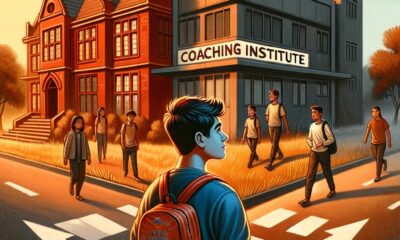

Addressing the Transition From Classrooms to Coaching: The Shifted Focus
-


Questioning the Trend of Lavish Farewells- #FarewellFiasco
-


Young Birders’ Workshop Opens Registration for Children Aged 10-13 Years
-
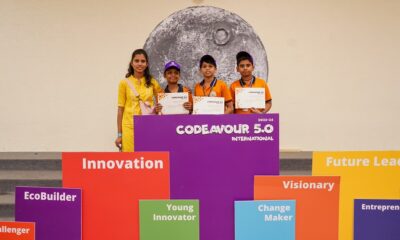

STEMpedia Successfully Completed Codeavour 5.0- India’s National Innovation Fest
-


Reviving School Education: Countering the Coaching Centre Dominance
-
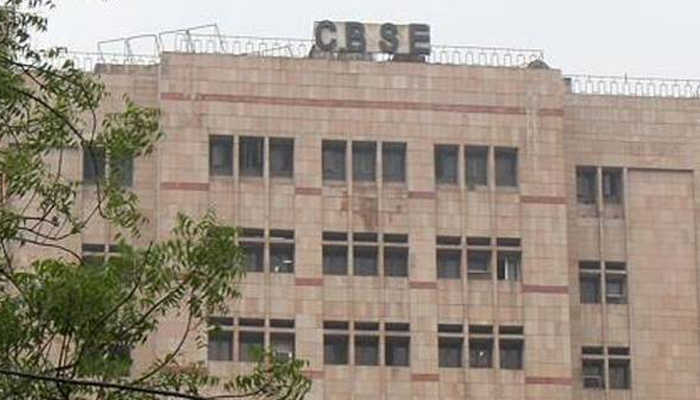

CBSE to Initiate Pilot for National Credit System in Grades 6, 9, and 11
-


The Role of Marketing in Education: Navigating the New Educational Landscape
-


From Overwhelmed to Empowered: Strengthening Educator Skills for Success
-
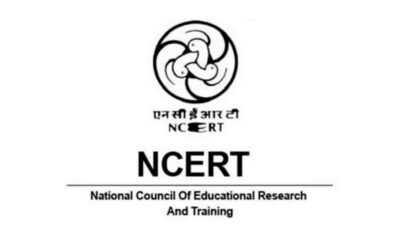

NCERT Introduces Bridge Month Programme for Class 6 Amid Textbook Transition
-


Indian Embassy Advocates for India-US Collaboration in Education Sector
Knowledge
Young Birders’ Workshop Opens Registration for Children Aged 10-13 Years
Published
4 days agoon
April 16, 2024
Early Bird, a not-for-profit initiative by the Nature Conservation Foundation, has announced the launch of an online birdwatching workshop tailored specifically for young enthusiasts aged 10-13 years. As birdwatching gains popularity across India, Early Bird aims to deepen young birders’ understanding of their natural surroundings, beyond merely ticking off bird names from their lists.
Set to commence during the summer holidays, this 4-week intensive programme will explore various themes through online sessions that combine multimedia, guided interactions, and lively discussions. These weekly live sessions will be held on consecutive weekends, each supplemented by an illustrated activity sheet that encourages participants to engage with and observe the green spaces around their homes.
The workshop is designed not only to educate but also to foster a deeper appreciation and awareness among children of the ecosystems they inhabit. “The workshop has changed our lives so much. We have found around 30 bird varieties around our house which we were completely unaware of,” shared Rupinder Kaur, a parent of a participant from previous workshops.

“My son never journaled or made notes. Now, he has started noticing everything when we go out to walk and wants to carry his journal. He has always hated writing but now carries his book and pencil and is ready to make notes. This workshop has made a difference to the way he looks at things. Quite enlightening. Has a lot to ask and share.“ said another participant’s parent.
While the workshop itself is free to attend, there is a nominal fee of Rs. 800 for materials, ensuring that all participants have access to the necessary resources to fully benefit from the experience.

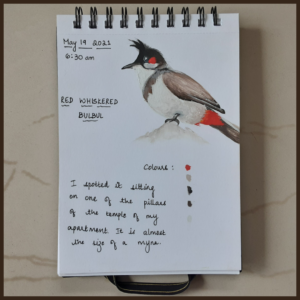


Registrations for the workshop are now open and can be accessed through the link provided here. This initiative aims to be an enlightening experience, allowing young minds to discover and connect with the biodiversity that exists right in their backyards.
Early Bird continues to dedicate itself to bringing children closer to nature through educational content, training educators, and direct outreach, fostering a new generation that values and conserves our natural world.
Education
STEMpedia Successfully Completed Codeavour 5.0- India’s National Innovation Fest
Published
5 days agoon
April 15, 2024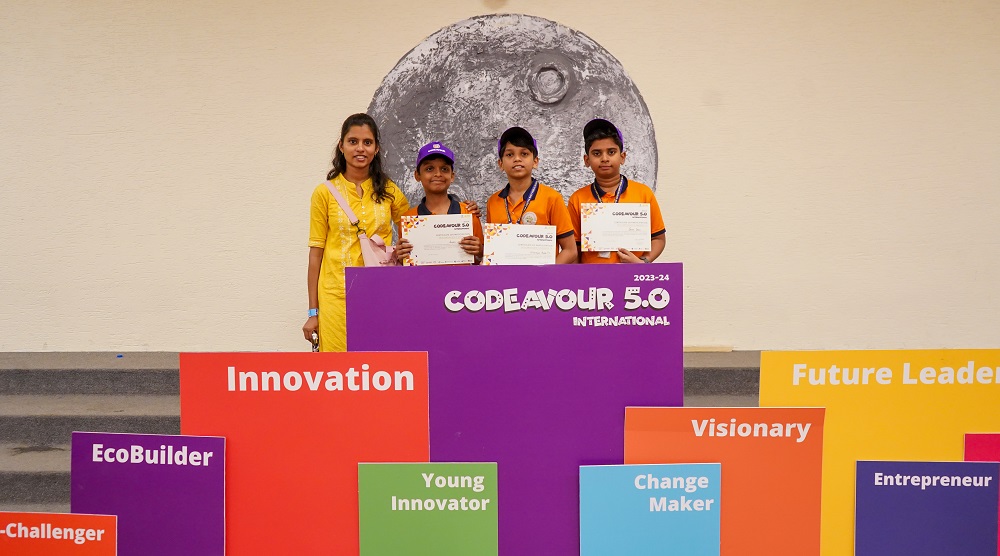
STEMpedia, in collaboration with ART PARK@IISc, India’s premier AI & Robotics Technology Park, established by the Indian Institute of Science in Bengaluru, successfully concluded the national level event of 2023’s biggest innovation fest, Codeavour 5.0 International. This year’s event, supported by leading organisations including AI Foundry, Startup India, and INDIAai, witnessed participation from 300,000 students across 70 countries, underscoring its global impact and the cumulative achievements of the competition to date.
The event, which also enjoyed backing from entities like AWS, NITI Aayog, and STEM.org, focused on fostering hands-on learning and innovation among next-gen participants. They were encouraged to create projects using PictoBlox that would contribute towards making the world a better place, aligning with the United Nations Sustainable Development Goals.
Dhrupal Shah, Director and CEO of STEMpedia, reflected on the journey and the fest’s objectives, saying, “Five years ago, we initiated Codeavour with the intention to empower young innovators and equip them with the necessary skills for the future workforce. This year, we are thrilled to announce that the top 20 winners will be awarded a trip to Mexico to participate in the FAB24 Event, accompanied by their mentors.”
The fest not only highlighted the technical skills of young minds but also provided them with a platform to showcase their creative solutions to real-world problems. In addition to the innovation and entrepreneurship track, participants competed in the AI-Robo City Challenge, demonstrating their prowess in applying AI and robotics to urban development challenges.
The panel discussion titled “AI EduFusion Conclave: Shaping Global School Education with AI, Robotics, and Policy Insights” was a highlight of the event, featuring experts like Dr. Sreejit Chakrabarthy from GEMS Dubai American Academy and Mr. Pankaj Verma from STEMpedia. The discussion provided insights into how governments and educational institutions are integrating AI and robotics into school curriculums to prepare students for future job markets.
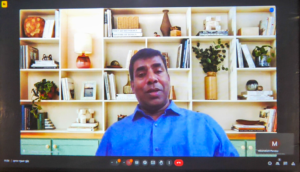
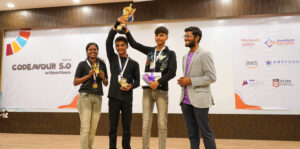
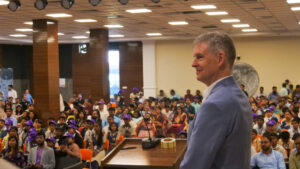
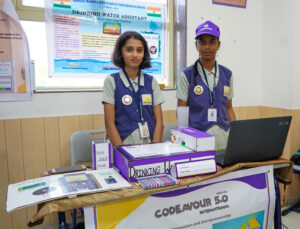

The event culminated with the National Innovation Awards, where participants presented projects that tackled environmental challenges and proposed sustainable solutions. Winners from the event will now proceed to the International Showdown in Dubai, hosted in partnership with Dubai American Academy.
As Codeavour 5.0 International wraps up, its success marks a significant step forward in integrating technology and education, inspiring the next generation of innovators and leaders to think critically and act creatively. The continued expansion of this fest promises to keep pushing the boundaries of what young students can achieve in the fields of AI and robotics.
Education
CBSE to Initiate Pilot for National Credit System in Grades 6, 9, and 11
Published
1 week agoon
April 11, 2024
The Central Board of Secondary Education (CBSE) is set to launch the pilot for National Credit Framework for students in classes 6, 9, and 11, commencing in the 2024-25 academic session. This innovative step, aimed at fostering a seamless integration of school, higher, and vocational education, aligns with the National Education Policy (NEP) 2020’s vision for a holistic and flexible educational system.
Under the new scheme, students will have the opportunity to earn credits through a variety of learning avenues, including classroom teaching, laboratory work, projects, sports, performing arts, NCC, social work, vocational education, and experiential learning. These credits will be accumulated in the Academic Bank of Credit (ABC), linked to the student’s APAAR ID and DigiLocker, ensuring a cohesive and secure record of their academic journey.
The introduction of the National Credit Framework marks a significant shift towards competency and outcome-based education, aiming to bridge the gap in achieving learning outcomes. It encourages students to engage in additional courses, programs, or projects beyond the mandatory 40 credits, offering them the flexibility to tailor their educational experiences to their interests and career aspirations.
To facilitate the smooth implementation of this framework, the CBSE has developed draft guidelines, which have been refined through multiple workshops and received approval from the Union Ministry of Education. “To further test, refine, and assess their effectiveness in real-world contexts, a pilot implementation of these guidelines has been planned in schools affiliated with CBSE,” stated a letter from the CBSE to school principals.
Schools interested in participating in this groundbreaking pilot program have been invited to register their interest, marking a collaborative effort to enhance the educational offerings for students across the nation.
This initiative not only promises to transform the way students learn and earn qualifications but also paves the way for a more inclusive and flexible education system that caters to the diverse needs and aspirations of India’s youth. As the CBSE embarks on this ambitious journey, it sets the stage for a future where education is not just about accumulation of knowledge but the holistic development of every student.
(Source- PTI)
Education
NCERT Introduces Bridge Month Programme for Class 6 Amid Textbook Transition
Published
1 week agoon
April 10, 2024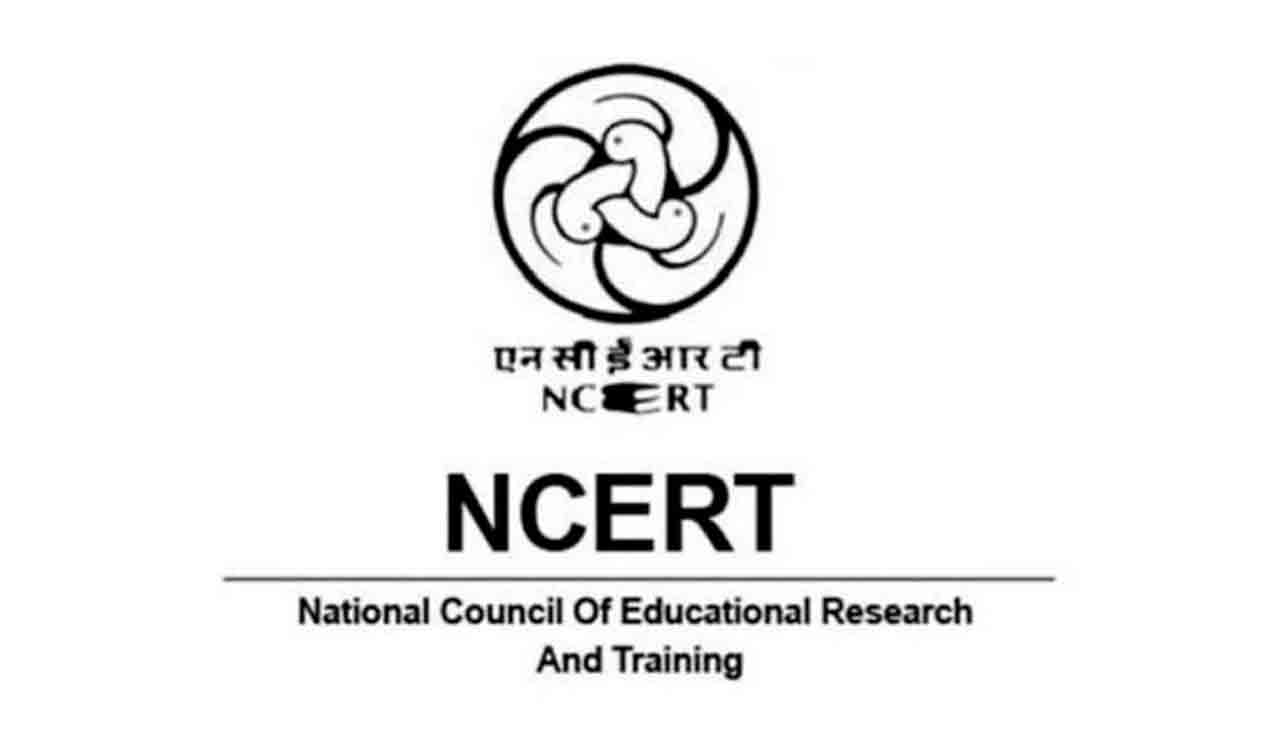
In a bid to revolutionize the educational landscape and foster a more dynamic learning environment, the National Council of Educational Research and Training (NCERT) has unveiled its Bridge Month Programme tailored for Class 6 students. This initiative marks a significant departure from conventional teaching methodologies, placing a heightened emphasis on interactive sessions and projects aimed at enhancing students’ overall skill set.
Aligned with the National Curriculum Framework for School Education (NCF-SE) and the recently implemented National Education Policy (NEP), NCERT’s Bridge Month Programme is poised to redefine the educational experience for both students and educators alike. By steering away from rote memorization towards a competency-based approach, the programme seeks to cultivate a deeper understanding of various subjects while nurturing critical thinking and problem-solving abilities.
The month-long bridge course is meticulously crafted to equip teachers with innovative pedagogical tools designed to engage students in enjoyable and enriching learning experiences. Through a curated blend of fun-based, play-based, and discovery-based activities, educators are empowered to guide students towards holistic development, transcending the boundaries of traditional classroom instruction.
Central to the programme’s ethos is the integration of vocational skills within the curriculum, commencing as early as Class 6. This forward-looking approach not only broadens students’ horizons but also fosters practical, real-world application of academic concepts. Additionally, the restructuring of the Grade 6 timetable allows for a dedicated immersion period, during which students can delve into a myriad of engaging activities spanning subjects like science, social studies, and vocational education.
With the impending release of new textbooks for Classes 3 and 6, NCERT’s phased approach ensures a seamless transition to the updated curriculum across all educational levels. As educators and students embark on this transformative journey, the overarching goal remains clear: to cultivate a generation of lifelong learners equipped with the skills and knowledge to thrive in an ever-evolving world.
As reported by India Today.
Education
Indian Embassy Advocates for India-US Collaboration in Education Sector
Published
2 weeks agoon
April 8, 2024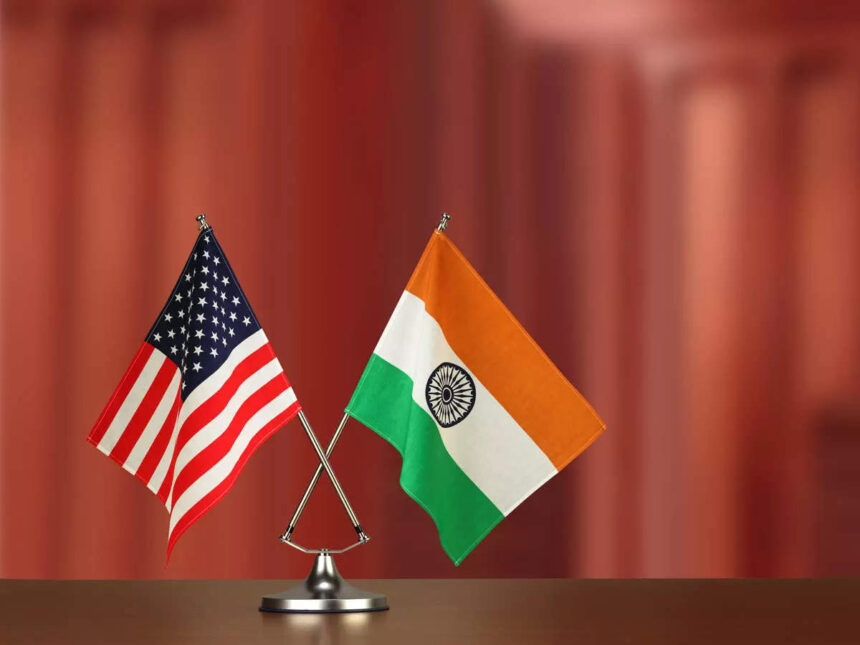
The Indian Embassy in Washington DC has underscored the significance of fostering collaboration between India and the United States in the realm of education. In a recent social media post on platform X, the embassy expressed contentment with the fruitful engagement it had with senior faculty members from esteemed universities in Washington DC.
During the interaction, the embassy stressed the substantial opportunities for bolstering knowledge and research partnerships between India and the US. This joint endeavour aims to bolster educational initiatives and advocate for the well-being of Indian students pursuing studies in the United States.
“Excellent interaction with senior faculty from prominent universities in Washington DC on India-US collaboration and opportunities for strengthening knowledge and research partnership and promote well-being of Indian students in the US,” stated the Indian Embassy in a post on X.
Moreover, amidst recent distressing incidents involving Indian nationals or individuals of Indian origin in the US, US Ambassador to India, Eric Garcetti, has addressed concerns regarding the safety of Indian students studying in the United States. Garcetti urged students to remain vigilant and employ appropriate safety precautions, while emphasizing the importance of staying connected with peers and utilizing campus safety resources to enhance awareness and preparedness.
In a recent interview with ANI, Garcetti acknowledged the distressing incidents involving Indian students, noting that such occurrences can statistically happen in a country of this scale. He reiterated the importance for students to remain vigilant and take necessary safety measures.
As per reports, five Indian students were reported dead in separate incidents in the first two months of 2024. (Source: ANI)
Education
CBSE Updates Exam Structure for 11th & 12th Class; Concept-based Questions Now 50% of Weightage
Published
2 weeks agoon
April 5, 2024
In a significant overhaul of the examination structure, the Central Board of Secondary Education (CBSE) has announced changes to the year-end assessment format for Classes 11 and 12, commencing from the academic session 2024-25. The board has decided to enhance the weightage for competency-based questions to 50%, a substantial increase from the previous session’s 40%. This adjustment aims to shift the focus towards application of concepts in real-life scenarios, aligning with the new National Education Policy (NEP) 2020.
The recent circular dispatched to all CBSE-affiliated schools outlines the board’s decision to reduce the weightage for traditional short and long-answer questions to 30%, down from 40% in the 2023-24 academic session. This move is part of the board’s ongoing efforts to foster an educational environment that prioritises critical thinking, creativity, and application of knowledge over rote memorisation.
“Continuing with its practice of aligning assessment and evaluation with the new National Education Policy (NEP) 2020 in the forthcoming 2024-25 academic session, the percentage of competency-based questions that assess application of concepts in real-life situations is increased by 10 per cent,” reads the circular issued on April 3.
Competency-based questions will encompass multiple-choice questions, case-based, and source-based integrated questions. According to a senior official from the CBSE, the increment in weightage for competency-based questions has been a consistent annual strategy for the past three years, reaching its peak at 50% this year.
The CBSE has chosen not to modify the examination format for Classes 9 and 10, maintaining the structure set during the previous academic year. The changes for senior secondary classes reflect the board’s commitment to the NEP’s vision of competency-based learning as opposed to the traditional textbook-driven approach.
“The main emphasis of the board was to create an educational ecosystem that would move away from rote memorisation and towards learning that is focused on developing the creative, critical and systems thinking capacities of students to meet the challenges of the 21st century,” the CBSE conveyed in its letter to school heads.
This reform is a stride towards equipping students with the necessary skills and knowledge to navigate the complexities of the modern world, ensuring they are not only exam-ready but also prepared for the challenges and opportunities that lie ahead in the 21st century.
Education
FPSB India and IIM Bangalore Forge Strategic Partnership to Advance Financial Education
Published
3 weeks agoon
March 29, 2024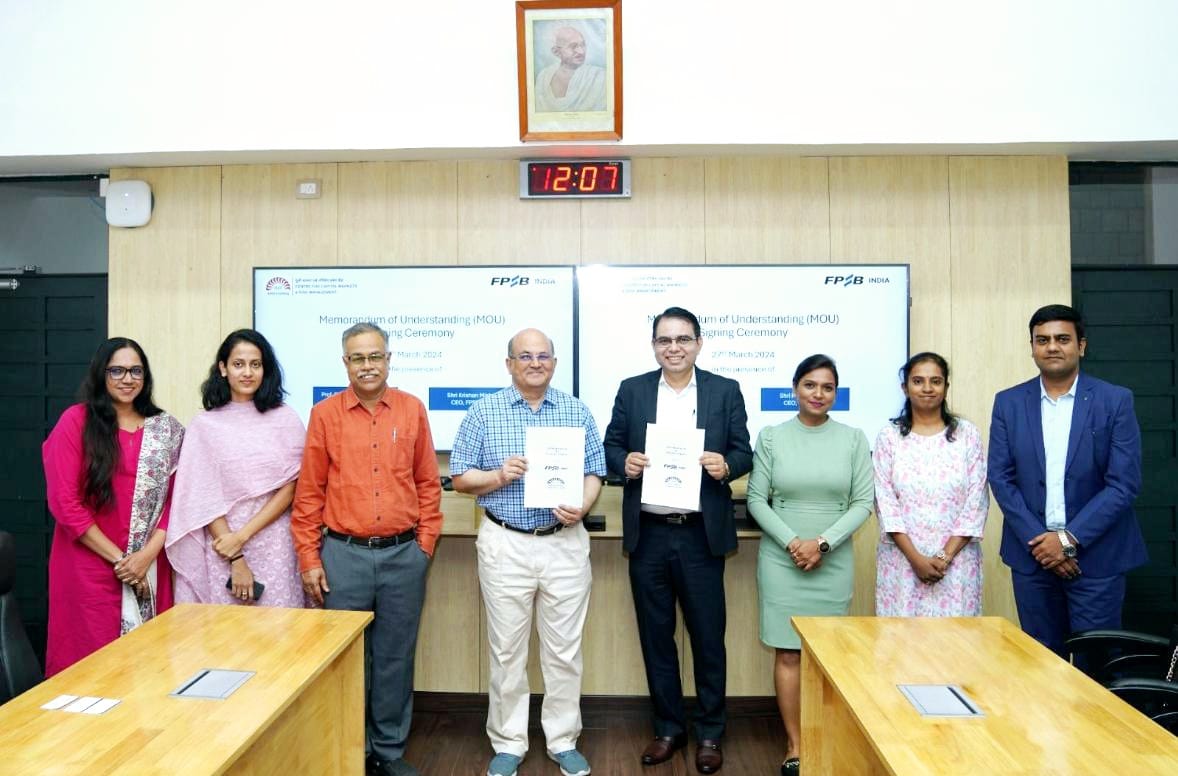
In a collaboration aimed at enhancing financial education and professional development in India, FPSB India and the Indian Institute of Management Bangalore (IIM Bangalore) have signed a Memorandum of Understanding (MoU). Announced on March 29, 2024, in Bangalore, this partnership is set to revolutionize the landscape of financial planning education for working professionals and students alike.
Under the auspices of this strategic alliance, an Executive Education Programme in Financial Planning will be launched, tailored specifically to meet the needs of working professionals and students. This programme is designed to address the growing demand for advanced education in financial planning, drawing on the combined expertise of FPSB India and IIM Bangalore to deliver a comprehensive and enriching learning experience.
In a move to further empower aspiring Certified Financial Planner professionals, FPSB India has announced the provision of five scholarships based on merit. This initiative underscores the commitment of both institutions to foster talent and equip candidates with the necessary skills and certifications for success in the financial planning sector.
Moreover, the partnership will see FPSB India and IIM Bangalore jointly creating Continuous Professional Development (CPD) resources and co-curating various initiatives and events. These collaborative efforts aim to make education and training in finance more accessible to students pursuing a career in this field, thereby bridging the gap between academia and industry.
Krishan Mishra, CEO of FPSB India, expressed his enthusiasm for the collaboration, stating, “This collaboration marks a significant milestone in our efforts to elevate the financial planning profession in India. By joining forces with IIM Bangalore, we aim to provide students with unparalleled opportunities to excel in the professional financial planning sector.”
Echoing these sentiments, Professor Rishikesha T Krishnan, Director of IIM Bangalore, highlighted the mutual goal of both organizations to enhance the connection between academic knowledge and practical industry application. “We are happy to partner with FPSB India in our shared mission to bridge the gap between academia and industry in the field of personal finance,” he said.
This partnership between FPSB India and IIM Bangalore represents a concerted effort to promote financial literacy, advance research, and cater to the evolving needs of the personal finance sector. Through their joint initiatives, both organizations are committed to nurturing a pool of talent that is poised to drive innovation and excellence in the financial planning services industry in India and beyond.
FPSB India stands as a leading authority in financial planning in India, dedicated to promoting professional standards across the country (with more than 2,731 CFP professionals in India and part of a global network representing over 223,700 professionals worldwide).
Education
1 in 6 School-Age Children Face Cyberbullying: Calls for Immediate Action
Published
3 weeks agoon
March 28, 2024
On 27th March 2024, WHO/Europe unveiled the second volume of the Health Behaviour in School-aged Children (HBSC) study, casting light on a growing concern in our digital age: cyberbullying. This comprehensive research, spanning 44 countries and regions, reveals some unsettling statistics – one in six school-aged children experiences cyberbullying, an issue magnified by the increasing digitalization of youth interactions.
Despite the stable overall trends in school bullying since 2018, the report highlights a notable rise in cyberbullying, underpinning the profound impact it has on young lives. The figures speak volumes: 12% of adolescents report cyberbullying others, with boys (14%) more inclined than girls (9%). This marks a worrying increase from previous years. Moreover, the experience of being cyberbullied has risen to 15% among adolescents, closely aligned between boys (15%) and girls (16%).
These statistics are alarming, not least because they often go unnoticed in schools. The invisible nature of cyberbullying means children suffer in silence, unable to voice their distress. In the Indian context, bullying – both offline and online – remains a pervasive issue, exacerbated by cultural and systemic barriers that discourage open discussion and resolution.
The advent of AI and deepfakes technology poses an even greater threat, making it easier to create and spread harmful content, potentially leading to an immense increase in cyberbullying incidents. This technological evolution, while offering myriad benefits, also amplifies the avenues for harassers to exploit, making it increasingly challenging to protect young people online.
Dr Joanna Inchley, HBSC study International Coordinator, emphasizes the dual nature of the digital world. “It offers incredible opportunities for learning and connecting but also amplifies challenges like cyberbullying,” she notes. This dichotomy necessitates comprehensive strategies to safeguard young people’s mental and emotional well-being, urging governments, schools, and families to collaborate in addressing online risks and ensuring adolescents have safe and supportive environments to flourish.
Dr Hans Henri P. Kluge, WHO Regional Director for Europe, frames this as both a health and human rights issue. “With young people spending up to 6 hours online every single day, even small changes in the rates of bullying and violence can have profound implications for the health and well-being of thousands,” he states. This underscores the urgent need for action to protect our children from violence and harm, both offline and online.
In response, WHO/Europe has recently published its first-ever position paper on protecting children from online harms. This groundbreaking document aims to support governments in formulating consistent requests to technology companies, with the overarching goal of securing healthy online environments for children to thrive.
The HBSC study’s findings underscore the complexity of adolescent bullying and peer violence, highlighting the crucial role societal, cultural, and technological factors play. By providing a detailed overview of current trends and challenges, the report offers valuable guidance for stakeholders at all levels in their efforts to improve the health and well-being of young people across Europe, Central Asia, and Canada.
Investing in evidence-based interventions to combat bullying and peer violence is not just about supporting adolescent well-being; it offers broader societal benefits. From reducing healthcare costs associated with mental health issues to improving educational outcomes, the stakes couldn’t be higher.
As we delve deeper into the digital age, the need for fast, comprehensive, and evidence-based interventions has never been more critical. Cultivating empathy, respect, and resilience among adolescents is paramount in creating a safer, more inclusive digital landscape. The time to act is now, ensuring every young person can thrive in an environment that promotes their health and development.
Education
GD Goenka Group To Establish 12 New Schools from April 2024
Published
3 weeks agoon
March 28, 2024
The GD Goenka Group has officially announced the launch of 12 new partner K12 schools across India, set to open in April 2024. This significant expansion underscores the group’s dedication to delivering quality education and promoting holistic development among students.
“The new schools aim to cater to the growing demand for high-quality education while bringing GD Goenka’s renowned curriculum and teaching methodologies to more communities across the country. These exceptional campuses are equipped with modern facilities and amenities to enrich students’ learning environment,” stated Mr. Nipun Goenka, Managing Director of GD Goenka Group.
The introduction of these schools is a strategic move by the GD Goenka Group to build a comprehensive network of educational institutions that excel in academic achievements and focus on nurturing individuals who are well-prepared to meet the challenges of Industry 4.0. The group’s presence will now extend to over 130 schools Pan-India, covering 20 states.
Mr. Gaurav Himkar, Group CEO, expressed his excitement about the expansion, remarking, “The opening of these 12 new schools reflects our dedication to building a larger pool of mutual benefits for GD Goenka partner schools by being a member of a pan-India GD Goenka ecosystem.”
These new institutions are poised to offer a diverse range of academic opportunities, specifically designed to meet the educational needs of students from various backgrounds and regions across the country.
Further details on the expansion were provided by Mr. Vipin Jha, Director of Partnerships, who noted, “A lot of new generation entrepreneurs reach out to us for partnership and have built world-standard school setups in the past couple of years. We have a steady pipeline of such new schools at least until the end of this decade.”
Mrs. Bharati Sharma, Director of Partnership Engagement, added, “The opening of these 12 schools underscores our commitment to expanding access to quality education. By providing state-of-the-art facilities and innovative learning environments, we aim to inspire and empower the next generation of leaders, thinkers, and innovators.”
This expansion by the GD Goenka Group is a pivotal step towards realising the vision of the institution in ensuring every child in the nation has access to quality education, setting the stage for a brighter and more prosperous future for the upcoming generations.
Education
India-Bhutan Strengthen Ties: Focus on STEM Education
Published
1 month agoon
March 18, 2024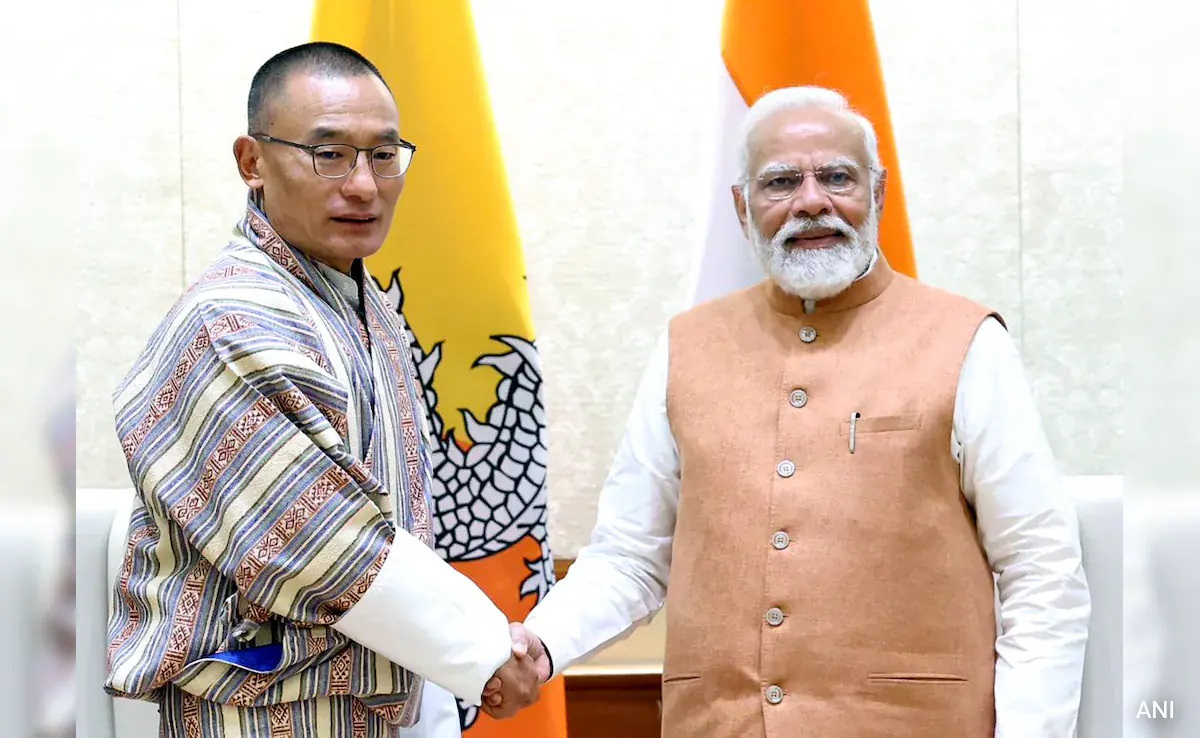
In a significant move to deepen bilateral relations, India and Bhutan have announced plans to expand their partnership in the education sector, particularly focusing on enhancing STEM (Science, Technology, Engineering, and Mathematics) pedagogy in Bhutan with the support of Indian educators. The decision comes in the wake of the Bhutanese Prime Minister, Tshering Tobgay’s recent visit to India, accompanied by his wife Tashi Doma, from March 14-18, marking his first international trip since taking office in January 2024.
According to a joint statement released by the two nations, the visit aimed at bolstering the already vibrant people-to-people relations, with education at the forefront of their collaboration. The initiative reflects a shared vision to strengthen the foundation of mutual understanding and cooperation in various sectors, including digital technology, startups, and STEM education.
Furthermore, the two countries have committed to enhancing collaboration in new and emerging fields such as digital technology and startups, alongside a continued focus on sports infrastructure development in Bhutan, a gesture appreciated by the Bhutanese side.
In addition, the partnership extends into space technology, with both nations acknowledging the fruitful collaboration in this domain. Recent initiatives, like the technical capacity-building programme on remote sensing technology organised by the Indian Space Research Organisation (ISRO) for the Royal Government of Bhutan, underscore the strategic and cooperative relationship between the countries. They also celebrated the formulation of a Joint Plan of Action on Space Cooperation, signifying a new chapter in their bilateral ties.
This enhanced collaboration marks a milestone in the Indo-Bhutanese relationship, paving the way for a future of shared growth and prosperity in the education and technology sectors.
(with inputs from ANI)
Newsletter

Addressing the Transition From Classrooms to Coaching: The Shifted Focus

Questioning the Trend of Lavish Farewells- #FarewellFiasco

Young Birders’ Workshop Opens Registration for Children Aged 10-13 Years

STEMpedia Successfully Completed Codeavour 5.0- India’s National Innovation Fest

Reviving School Education: Countering the Coaching Centre Dominance
CBSE to Initiate Pilot for National Credit System in Grades 6, 9, and 11

The Role of Marketing in Education: Navigating the New Educational Landscape

From Overwhelmed to Empowered: Strengthening Educator Skills for Success

NCERT Introduces Bridge Month Programme for Class 6 Amid Textbook Transition

Indian Embassy Advocates for India-US Collaboration in Education Sector

Nurturing Healthy Behaviors: The Role of Schools in Shaping Health-Conscious Citizens

CBSE Updates Exam Structure for 11th & 12th Class; Concept-based Questions Now 50% of Weightage

Sharing the spotlight: When parent and child take board exams together

Rebalancing the Scales: The Urgent Call for Humanities in STEM-Dominated Curricula

Palette of Possibilities: Nurturing Creativity in Schools through Modern Art

Empowering Minds: The Journey of My Guide Inside with Christa Campsall

The Potential of an Entrepreneurial Development Programme for Primary School Students

FPSB India and IIM Bangalore Forge Strategic Partnership to Advance Financial Education

1 in 6 School-Age Children Face Cyberbullying: Calls for Immediate Action

GD Goenka Group To Establish 12 New Schools from April 2024

World Theatre Day: Let Theatre Arts Make Classroom’s Showtime Spectacular!

Lessons Beyond a Cricket Pitch: An IPL-Inspired School Curriculum

Post-pandemic: Embracing Well-being in India’s Schools with My Guide Inside

The Intersection of Happiness and Technology in Education

India-Bhutan Strengthen Ties: Focus on STEM Education

Life of My Father: Dr. Jagdish Gandhi, a Pioneer in Education

Mayo College Announces New Leadership

Post-pandemic: Embracing Well-being in India’s Schools with My Guide Inside

Empowering the Future: The Success of Beti Bachao Beti Padhao in Girls’ Education

Is Students’ Data in Safe Hands in a Digital World?

Central Government Sets New Framework for Coaching Centres

FPSB India and IIM Bangalore Forge Strategic Partnership to Advance Financial Education

Radio Broadcasting in Schools: Creating a Platform for Student Voices

Kerala Introduces ‘Water-Bell’ Initiative in Schools to Boost Hydration

India to recognise Farsi as a classical language under New Education Policy

Farewell to a Pioneer: Dr. Jagdish Gandhi’s Enduring Legacy in Education

Anticipating a Progressive Leap: The Education Sector’s Hopes for Union Budget 2024

Lexicon Schools Spark Innovation with STEAM Fest

The Need to Preserve Newspapers for Bias-Free Education

A Voice for All Ages: The Enduring Legacy of Ameen Sayani in Indian Education

Target Publications hosts workshop for grade 10th and 12th students of Snehasadan Shelter Homes and Reap NGO

Seth M. R. Jaipuria School launches CBSE School in Bhiwadi, Rajasthan

From 2025-26, Indian Students to Get Two Opportunities to Sit for Board Exams

The Rising Leaders’ Summit 2024: A Timeless Learning for Future Educational Leaders

International Women’s Day 2024: Are We Not Special?

ISRO Launches Young Scientist Programme 2024 for Budding Space Enthusiasts

Teach for India Invites Applications for its 2024 Fellowship Program

Ministry of Women and Child Development Unveils National Curriculum Framework for Early Childhood Care and Education

World Theatre Day: Let Theatre Arts Make Classroom’s Showtime Spectacular!

India Sets 6-Year Minimum Age for Class 1 Admissions Nationwide
SGEF2023 | Special Address by Rama Datt, Trustee, Maharaja Sawai Man Singh II Trust, Jaipur

ScooNews | After Movie | ScooNews Global Educators Fest 2023

Aftermovie | NIES2 UP Chapter | 21 Jan 2023

WEBINAR | Gamification in Education: How Digital Badges Can Boost Student Motivation and Engagement

ScooNews | WEBINAR| Importance of Physical Activity for Children at School | Plaeto

SCOONEWS | WEBINAR | WHY DIGITIZING YOUR SCHOOL IS A MUST | TEACHMINT

Keynote Address | Lakshyaraj Singh Mewar

Anurag Tripathi, Secretary, CBSE at SGEF2022

How schools can nurture every student’s genius

Aftermovie | SGEF2022 | Jaipur

Li Andersson | Minister of Education | Finland

Anurag Tripathi, Secretary, Central Board of Secondary Education (CBSE) discusses NEP2020

ScooNews | Early Ed Asia 2019 | Aftermovie
#PodarECEconf : Pursuing quality ECE

#CBSE Class XII #Results #Highlights

The interesting story of India’s educational system | Adhitya Iyer

A young scientist’s quest for clean water

The Danger of Silence: Clint Smith

National Digital Library of India is an initiative by HRD Ministry

Remembering Kalpana Chawla on her birthday!

Message from Sadhguru for Students!
Message from Sadhguru for Students!

The Untapped Genius That Could Change Science for the Better

Eddy Zhong: How school makes kids less intelligent TEDxYouth@Beacon

#TEDxCanberra : What if every child had access to music education…
Trending
-
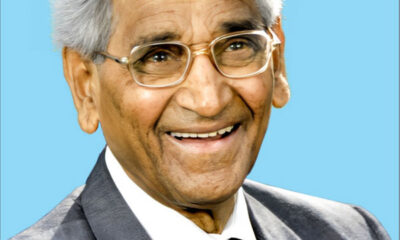
 Inspiration1 month ago
Inspiration1 month agoLife of My Father: Dr. Jagdish Gandhi, a Pioneer in Education
-
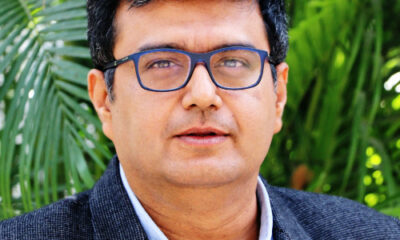
 Education3 months ago
Education3 months agoMayo College Announces New Leadership
-

 Education4 weeks ago
Education4 weeks agoPost-pandemic: Embracing Well-being in India’s Schools with My Guide Inside
-
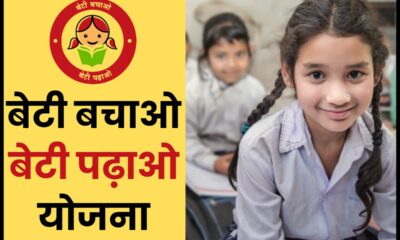
 Education3 months ago
Education3 months agoEmpowering the Future: The Success of Beti Bachao Beti Padhao in Girls’ Education
-

 Knowledge3 months ago
Knowledge3 months agoIs Students’ Data in Safe Hands in a Digital World?
-
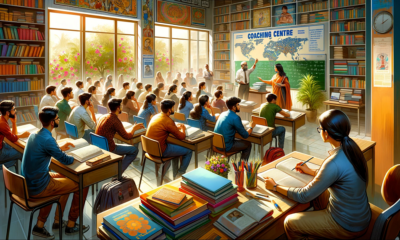
 Education3 months ago
Education3 months agoCentral Government Sets New Framework for Coaching Centres
-
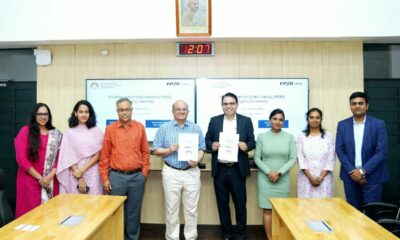
 Education3 weeks ago
Education3 weeks agoFPSB India and IIM Bangalore Forge Strategic Partnership to Advance Financial Education
-

 Education2 months ago
Education2 months agoRadio Broadcasting in Schools: Creating a Platform for Student Voices
-

 Education2 months ago
Education2 months agoKerala Introduces ‘Water-Bell’ Initiative in Schools to Boost Hydration
-
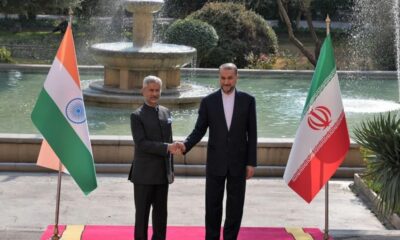
 Education3 months ago
Education3 months agoIndia to recognise Farsi as a classical language under New Education Policy


